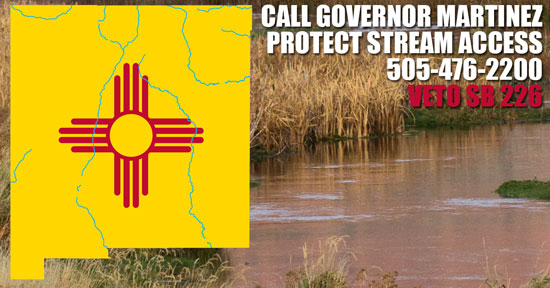
While you were waiting to hear from us about the outcome of the Weber Trial ( we haven’t heard anything from Judge Kelly yet), you probably weren’t expecting an email about stream access in New Mexico. However, that’s exactly what this email is about.
On Friday, in the final minutes before the New Mexico legislative session adjourned, in an all-too-familiar fashion, stream access there was stripped from the public and handed over to private interests. Just like that, our concerns that another state could follow Utah’s lead on stream access went from possibility to reality. We are all in this together, and that’s why it’s important for you, as USAC members, to step up and take action.
The bill in New Mexico, SB 226, restricts access to rivers and streams that cross over private property, like HB 141 in Utah. It passed the House on a 32-31 vote, and is now sitting on New Mexico Governor Susana Martinez’s desk. She is expected to sign the bill into law by the end of the week. This is where we can help. Educate Governor Martinez on why she must VETO SB 226.
EMAIL: http://www.governor.state.nm.us/Contact_the_Governor.aspx
Tell Governor Martinez to VETO SB 226. Tell her that anything other than a stroke of the Veto pen is a mark against public rights. Tell her to look to their neighbor to the northwest, and the coalition of thousands that have rallied to fight for public rights. Tell her that millions of taxpayer dollars WILL be wasted on needless lawsuits to overturn the law. Tell her that complicating access laws will compromise the $607M annually that sport fishing brings to the New Mexico economy. Tell her that access and use of PUBLIC water belongs to the PUBLIC. Tell her that Vandalism, Littering, and Trespass are already against the law, and need to be enforced, without codifying additional unnecessary access restrictions. Tell her that 2 state Supreme Court decisions, Red River in New Mexico and Conatser in Utah support the constitutional rights of the public to access and use their waters. Tell her that what will follow will be bolstered by the momentum of ALL citizens, inside and outside of New Mexico’s borders, that want to protect and maintain public access to public waters.
Utah Steam Access Coalition




4 Comments
This is what I emailed today to Gov. Martinez (in addition to phoning):
Dear Governor Martinez;
Like many other out-of-staters, fellow flyfishers and I visit New Mexico several times yearly (in my case for more than 35 years) to enjoy its trout waters and glorious scenery. (I can leave the Washington DC area and be on a New Mexico stream the same day). We spend an average of at least three days per visit and at least an average of $300 daily on food, lodging, car rental, guide fees and fishing tackle, plus the cost of out-of-state licenses.
Restricting public access to public water will compromise the $607M annually that sport fishing brings to the New Mexico economy. Vandalism, littering, and trespass are already against the law and need to be enforced Adding unnecessary access restrictions will only bring more enforcement costs and problems plus costly legal battles. Two state Supreme Court decisions, Red River in New Mexico and Conatser in Utah support the constitutional rights of the public to access and use their waters. New Mexico taxpayers provide resources to maintain the health of public waters for all state residents through WQCC water quality protections and other measures. The public has the right responsibly to access the waters that public funds protect.
I sent an email saying this was counterproductive. I too spend a goodly amount of money vacationing in NM (being from AZ), and if fishing access is to be restricted by this legislation, I will need to cancel this year’s reservations and just stay in Colorado/Montana instead. I’ve boycotted Utah for similar, and while I would hate to have to do it, would do the same for NM. I refuse to spend money in places which are so unfriendly. Even the nutcase who rule Arizona have not (yet) gone so far. Told her I hope this is vetoed, as I would like to continue visiting NM, but I absolutely will vote with my feet if forced.
New Mexico Stream Access has now been clarified for all via SB 226
Unfortunately, the Utah Stream Access Coalition Board of Directors have it all wrong, no one in New Mexico will be denied access to fishing. The state will operate as it has for the last 85 plus years when fishing became a well utilized leisure time activity. I am a river land owner and one of the three principle citizens that worked for the clarification of property rights in New Mexico. Senate Bill SB 226 will save the taxpayers in New Mexico millions of dollars in law suits and will protect thousands of miles of river fishing in the state.
All states have a definition of stream or river access, some are very clear and well defined, others are more vague. Many states have similar definitions but most vary slightly from each other’s full or restricted river access policies. Two good examples would be Montana and Colorado. It all comes down to the definitive definition of ‘Private Property’ verses ‘Public Easements’ which are very clear from all legal stand points. All running water is public, i.e., owned by the citizens, managed and controlled by Federal, State and sometimes local governments. Some people do have water rights but no one owns the water.
In Montana, when you buy property with a river running thru it, it is clear on the property’s title, i.e., deed that all land under the river is NOT private property but an ‘easement’ of that deed. This means the public may access the stream bed via walking, floating or by anchored boat which is floating. You may not access the river by trespass via private property without the landowner’s permission. To wade the river legally, you need to gain access to the river via a public entrance such as a bridge or a public road that has public proximity to the high water line which would let you enter the river without touching ‘Private Property’. Once in the river you may move up or down river at will, up to the historical ‘High Water’ mark.
In Colorado you have a different set of rules. Again, going back to the ‘title and deeds’ of said properties that have streams and rivers running thru them. In Colorado, the water again is public but in this state, if the deeds of the property give a list of the acreage that is under the river as ‘private property’, then access it treated just as any other piece of land that is private property. So in this case, the land owner does not own the water but they do own the land under that water, which is their private property. This means the public may float over the private property and fish that water but they cannot touch the streambeds by any means, which would include wading, standing or dropping of an anchor. There is a caveat, you may touch the ‘private property’ incidentally to ensure safe passage, i.e., push off rocks. You may also use a paddle or oar to assist moving beached watercraft that may be temporarily stuck on a sand bar of rock. If the angler or public wants to wade the river or drop anchor to hold still and fish a specific spot, they will need the landowners permission first and without that permission they may be sited for ‘Trespass’.
Now for New Mexico…. It is being stated the bill in New Mexico, SB 226, restricts access to rivers and streams that cross over private property. This is totally false because New Mexico has operated on the same assumptions as Colorado for years; anglers do need the landowner’s permission to wade or drop anchor on rivers with deeds of that have said private property. This has been written in every New Mexico Department of Game and Fish Proclamation for as long as the department has been established. Land under the river is private property where deeds and title verify that fact.
So why now the need and justifiable passing of SB 226? It was a fact that the outgoing State Attorney General, Mr. Gary King, was running for Governor last year. In an unethical and un-researched act, he issued an attorney general opinion, not law, just an opinion, that the public could enter private property without permission as long as there was water over that private property. This opinion caused massive confusion for the public and the fishing community in general. The New Mexico Department of Game & Fish and its Commission knowing they barely had the resources and budgets to manage the public lands under their charter at this time were extremely concerned. They knew if this opinion was not challenged, it would open up thousands of miles of water of and create an unfetter assault by the public. If SB 226 was not passed these waters would have been devastated by over fishing and unchecked harvesting of fish with no civic controls, the NM Game & Fish commissioners knew they just did not have the resources to deal with the problem. In reality it was a Godsend that the bill did get passed and this will ensure that New Mexico rivers will fish well for generations to come. SB 226 struck down the incorrect AG Opinion and makes it clear for all citizens and the public to know what the law is. In reality nothing has changed and nothing has been taken from the public for there was nothing to take away in the first place.
In closing I know that ‘Stream Access’ is an emotional topic for the entire angling community. I myself like to see as much access for the public as possible. I let considerate members of the public fish and wade my private section of the river all the time and at no time do we ever impede those anglers or boaters floating over my private property. Should New Mexico change its charter on stream access from the Colorado model to something like the Montana model? Well, maybe someday but if this to happen it needs to be done the correct way, through legislation not through law suites. There are other options too, like the River Reach programs or Western Rivers Conservancy, where a mixture of private and public organizations buy or get property donated by the river land owners for the public to use. Maybe the State or Feds should offer the landowners incentives to open access. This would be the correct way to make change, for this is America, we don’t operate on a ‘bait and switch’ on its citizens. Landowners who invested in States like Colorado or New Mexico have a valid deed on property that they worked hard to acquire, they cannot be removed with an opinion. Right now the State of New Mexico, top consideration will be honoring those deeds as is legally correct to do. This now can be done and done with no misunderstanding with the signing of SB 226 to make the law clear.
With this explanation I ask Governor Martinez to sign SB 226 without hesitation.
Kind regards,
Lawrence W. Johnson Jr.
Owner: Soaring Eagle Lodge
[email protected]
Larry,
Interesting thoughts here. You’re correct, that you own the property below the streams & pay taxes on it – the property below the river is in your deed, but you neglect the fact that your own constitution and the NM Supreme Court have very carefully clarified the easement that runs over your land, below the ordinary high water mark of the stream. The same document that protects your private property rights (the NM constitution) also protects public property rights, and that’s the issue at stake here. Nobody wants to cross your property to get to the river – that’s trespassing, and it’s illegal. Similarly, littering and vandalism, if they were to occur, are also illegal and should be enforced. Anglers should always respect private property rights, and part of that is a courtesy to let the landowner know when they’re present for a number of reasons. But whether or not they go to your door to ask permission, they are still within their constitutional rights to stand within the stream bed while utilizing their resource.
If the river floods, no doubt that public dollars will be used to mitigate the damage to your ranch. No doubt that public dollars went into stocking the fish somewhere in the drainage that crosses your property. So if the public bears the burden to maintain that river, why should the public have to pay more to utilize the river by ‘incentivizing’ the landowners? If you set up an access ladder to cross your property, that’s one thing, but that’s not what’s at stake here. We’re talking about accessing from public right of ways – such as pre-established public access sites from the NMDGF and bridges. Kudos to you for allowing people to access and use their river where it crosses your property, but forgive me for taking that with a grain of salt – the promise that access would remain open on private ranches in Utah was ‘forgotten’ as soon as HB141 was passed into law, and lodge/ranch owners realized they could be compensated if they joined the state Walk-In-Access program. Now even that program is seeing a dramatic decrease in enrollment, as people realize they can opt-out at any time and charge their own arbitrary rod fees from anglers. As far as the sky-falling claim that the rivers and streams will be decimated by the floods of anglers? Even if that baseless claim were true it’s well within the law for the NMDGF to place additional restrictions – catch and release only, closures during the daytime heat, etc…
You listed 2 states, Montana and Colorado – both with vastly different constitutions from New Mexico’s. Here’s a couple more states – Idaho and Utah, with constitutions much more similar to NM. Property owners in Idaho also have a valid deed on their property below the river – yet their law allows anglers to move up and downstream below the ordinary high water mark with nary a conflict. That law has been in place for nearly 40 years. It was put in place in the 1970’s after the IDFG and property owners sought to address potential conflicts and avoid costly legal battles. Perhaps such a law would strike a valid compromise in your eyes, too?
The situation you are facing in NM is more similar to the Utah case than you may be aware. In Utah, property owners have deed to the property below the non-navigable rivers and streams. In Utah, private property owners and lodges, such as yourself, argued before the legislature that the rivers have “always been private,” neglecting the Utah Constitution and 3 Utah Supreme Court decisions. Their arguments were based in rhetoric, not in fact. In Utah, private property owners succeeded in getting their bill passed, much as you are hoping to do in New Mexico. After 5 years the law is still being challenged after hundreds of thousands if not millions of dollars in litigation – a bill footed by the State, the very same group of private property owners who sought to restrict access in the first place, and the Utah Stream Access Coalition. Indeed, this is America, where we don’t pull a “bait-and-switch” by taking public property rights that most didn’t know they had and disposing of them to private interests. Rather than doing such a back-door, last-minute, sneak the bill through tactic as happened at the end of the session, why not veto the bill and study it in interim? You seem like a reasonable man, and I have no doubt that you and your cohort could come to a compromise on access if you were to sit down with organizations such as the NMWF and hash out your differences. Have an open discussion, where anybody that has anything at stake can come to the table and say their piece, crafting a bill that addresses all concerns. This is the way that good laws are made that stand the test of time, and benefit future generations of New Mexicans.
Or, you can wait for the legal challenges to SB 226 to weave their way through the courts, and let people much smarter than you (or me) decide what’s right for New Mexicans based on the New Mexico Constitution and Supreme Court precedent. I’m no legal scholar, but that sounds risky.
Sincerely,
Kris Olson